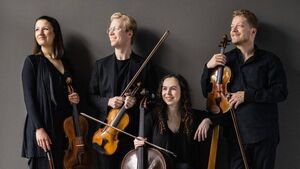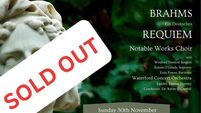View from the Green Room: Quartets perfect for the Large Room

The Marmen String Quartet.
John Roberts’ Large Room is the perfect home for a string quartet and when the Marmen String Quartet opens with one of Haydn’s (1732 –1809) most famous quartets - his Sunrise Quartet – we’re all in seventh heaven. The packed attendance in the Large Room is not slow in showing its appreciation for a darling composition from the Austrian composer regarded as the ‘Father of the String’ quartet.
Haydn spend much of his working life as music director for the wealthy Esterházy family at their palace of Eszterháza in rural Hungary. Though he had his own orchestra there, he was isolated from other composers and forced "to become original".
However, his music was published widely making him the most celebrated composers in Europe.
The death of his patron Esterházy in 1790 liberated the aging composer and the availability of superb musicians and rich audiences in London and Vienna inspired a dozen quartets, four keyboard sonatas, four Masses, 10 symphonies and an oratorio. Not bad for a lad in his sixties.
The 1976 Quartet in B-flat was a massive hit and dubbed the ‘Sunrise Quartet’ by an adoring public who recognised the dawn becoming daylight movement of the piece. The intro to the opening Allegro is pure magic with its gentle soft chord on violin, suggesting the growing dawn before light explodes across the floor with an attack of power and melody.
It’s a pattern that’s repeated throughout the Allegro before we find ourselves somewhere in a gentle Andante that’s brimful of poignancy.
There’s a Minuet here that’s full of surprises with a transformative mix of folk music that moves along from German ale-houses to pastoral French countryside. The final Allegro ma non troppo (fast, but not too fast) is an accelerating delight as the tempo and melody buzzes along in a glorious finale.
The Bartok String Quartet No. 3 is the stuff of Hitchcock movies. Screeching chords, long atonal bowing packed with tension, melody that comes together almost in anger before falling away. An overall feeling of existential struggle. This third quartet is generally regarded as Bartok’s most difficult but the Marmen’s performance of it is a joy that’s packed with power, energy and life.
A rather special performance of Pádraig Colum’s ‘She MovesThrough the Fair’ brings us to a place of gentle reflection after the excitement of the Bartok. Cellist Sinéad O’Halloran has an earthy soprano as she accompanies herself and the quartet in a new accompaniment from the pen of Sam Perkin entitled ‘My Young Love was Gone’.
Sinéad captures the enigmatic quality of Colum’s ballad of love denied. The Gaelic lyricism of the poem is its soul and Sinéad’s wonderfully restrained and understated performance with lyrics, such as ‘She turned away homeward with one star awake Like the swan in the evening moves over the lack’ hangs in the Large Room like Emily Dickenson’s ‘butterfly’s plash in air’.
The Beethoven Quartet in F major is the last of Beethoven’s (1770-1827) 16 string quartets and was only performed a year after his death. Ludwig knew it would be his last composition and the finale’s famous inscription ‘The difficult decision’ still intrigues. Beethoven sent this touching note to the publisher along with the final manuscript for Op. 135:
The Quartet feels as if it’s recalling elements of Beethoven’s style from the very beginning and blends it with later compositional style. T. S. Elliot wrote in his Four Quartets (inspired by Beethoven's late chamber music), it is:
A perfect finale for a very special concert from Waterford-Music and the splendid Marmen String Quartet.






